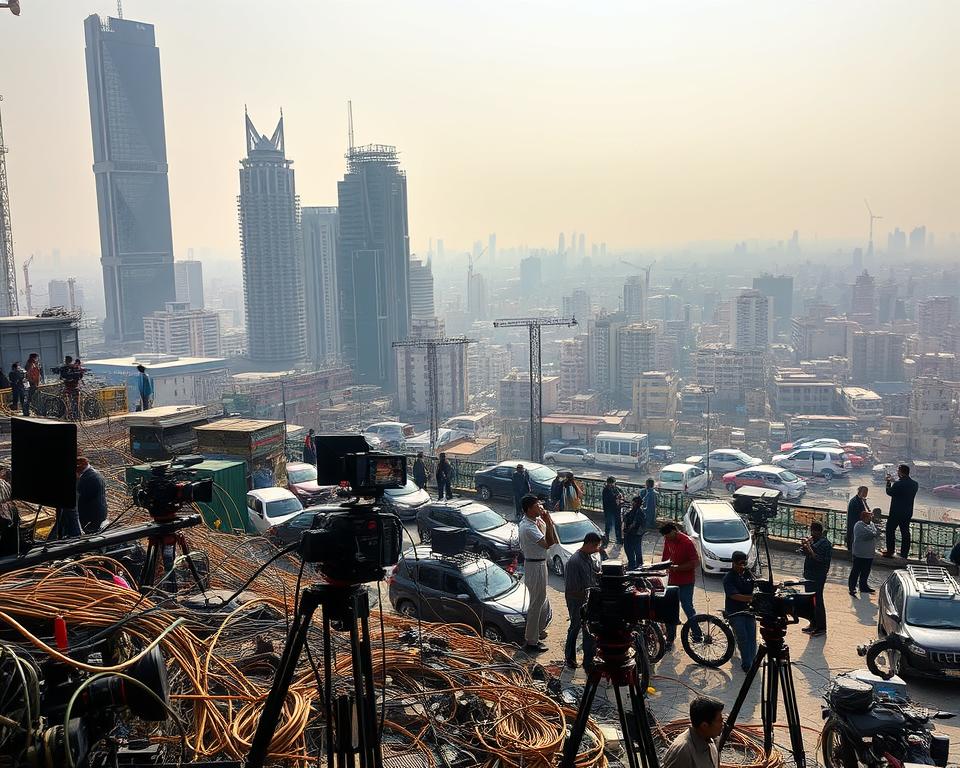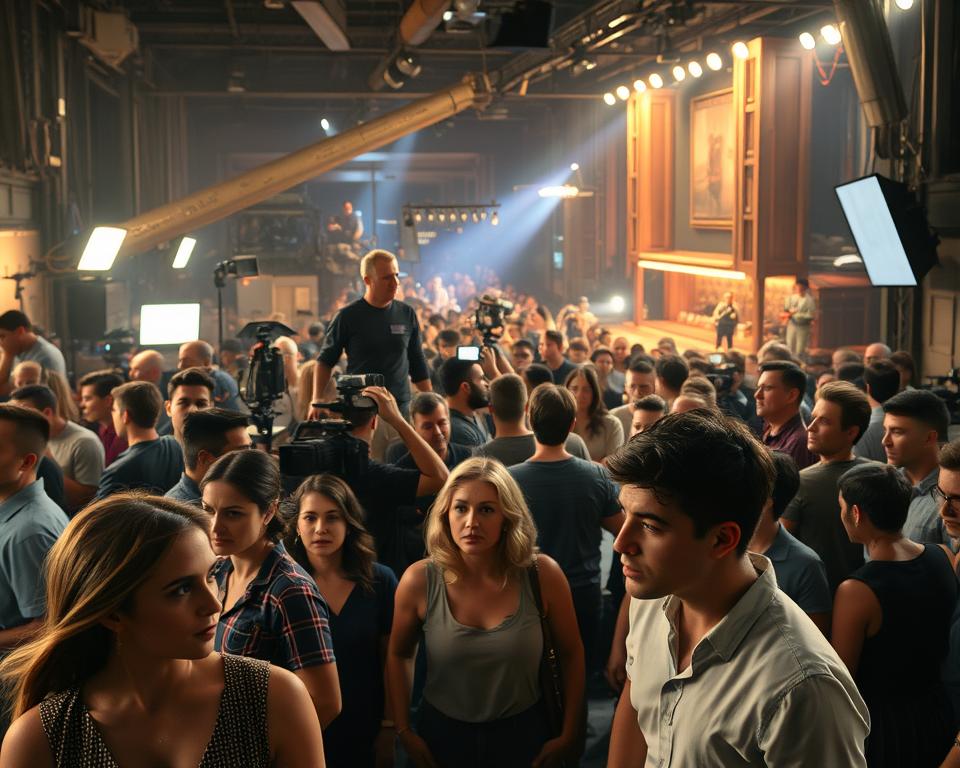The Indian entertainment industry is full of life and variety. It offers many chances for those who love media production jobs and creative work.
There are actor roles in TV shows and movies. Also, editor roles in post-production are available. Plus, assistant roles play a big part in helping projects run smoothly.
These roles are very important. They help make content that grabs the attention of viewers all over the country.
Key Takeaways
- Variety of roles available in the Indian entertainment industry.
- Opportunities for actors, editors, and assistants.
- Importance of supporting roles in production.
- Diverse range of media production jobs.
- Creative and technical skills in demand.
- Opportunities for growth and development.
The Landscape of Media, TV & Film Production Jobs in India
The media, TV, and film industry in India is growing fast. This is thanks to new tech and changing what people want to watch. Now, there’s more demand for top-notch content everywhere.

Current Industry Size and Growth Projections
In 2022, the media and entertainment industry in India was worth about ₹1.8 trillion. It’s expected to hit ₹2.5 trillion by 2025, growing at 11.4% each year. This growth comes from more digital content, online media use, and more TV and films.
A KPMG report says the government’s support and streaming’s rise also help the industry grow.
| Year | Industry Size (₹ trillion) | CAGR (%) |
|---|---|---|
| 2022 | 1.8 | – |
| 2025 | 2.5 | 11.4 |
Major Production Hubs Across India
India has many production centers, with Mumbai leading the way. It’s where most films and TV shows are made. Chennai, Hyderabad, and Bengaluru also have big film industries, mainly for Tamil and Telugu movies.
These places offer lots of jobs in film making. You can work as an actor, director, or in other roles like cinematography and editing.
Industry Trends Shaping Job Opportunities
The media world is moving towards digital content. Streaming services like Netflix and Amazon Prime are creating a big need for new shows and movies. This means more jobs in making content, editing, and managing production.
“The rise of digital platforms has opened up new avenues for content creators and producers, enabling them to reach a wider audience and experiment with innovative storytelling formats.” –
Technology is also changing film making. Things like virtual production and AI in editing are becoming more common. This brings new job chances in these areas.
Essential Skills and Qualifications for Media Production Careers
Starting a career in media production needs creativity, technical skills, and knowledge of the industry. You must know the latest tech and trends.
Educational Pathways and Degrees
Getting a degree in media production or related areas is a good start. Courses in film, TV studies, or media arts are helpful. Many schools offer programmes that teach both the creative and technical sides of media.
Self-Learning vs. Formal Education
Formal education is great, but self-learning is also valuable. Many industry pros are self-taught. They learned by doing projects and getting internships.
Industry-Recognised Certifications
Getting certifications that the industry recognises can boost your skills. Certs in software like video editing or cinematography can help you stand out.

To do well, you need a mix of creative skills and technical know-how. Mix formal education with self-learning and certifications. This way, you’re ready for a career in media production.
Acting Roles in Indian Media and Film
The Indian media and film industry has many acting roles. These roles fit different talents and likes. You can find everything from main characters to background actors.
Types of Acting Positions Available
The Indian entertainment world has lots of acting jobs. These jobs are in TV, film, and digital media. You can find roles like:
- Lead roles
- Supporting characters
- Television acting
- Film acting
Lead Roles vs. Supporting Characters
Lead roles are the main characters in a story. Actors need to be able to carry the story. Supporting characters add depth and help the main story.
Television vs. Film Acting Opportunities
Television acting is for serials or shows on TV. Film acting is for movies. Both offer chances to show your talent.
Requirements and Audition Process
To get acting roles, you must go through a tough audition process. This includes:
- Submitting headshots and resumes
- Attending auditions
- Performing cold readings or scripted scenes
What you need for acting roles changes with each production. But, you always need to know your craft well and take direction well.
Building an Acting Portfolio
A good acting portfolio is key for new actors. It should have:
- High-quality headshots
- A resume with your acting history
- Demo reels to show your skills
A strong portfolio makes you stand out. It boosts your chances of getting auditions.
Editorial and Post-Production Careers
In India, careers in editorial and post-production are becoming more popular. This is because people want high-quality content. The post-production stage is key. It turns raw footage into a story through technical and creative steps.
Video Editing Roles and Responsibilities
Video editing is a big part of post-production. It involves putting footage together to tell a story. Video editors work with directors to make sure the final product matches the vision.
They check the footage, pick the best parts, and edit the story. This makes the visual part of the film or TV show engaging.
Sound Editing and Design Positions
Sound editing and design are also vital. They add sound effects, FX, and music to enhance visuals. Sound editors and designers aim to create an immersive audio experience.
They balance dialogue, sound effects, and music. This makes the film or TV show more impactful.
Required Technical Skills and Software Proficiency
Technical skills are essential in editorial and post-production careers. Knowing industry-standard software is key for video and sound editors.
Industry-Standard Editing Software
| Software | Primary Use | Industry Prevalence |
|---|---|---|
| Avid Media Composer | Video Editing | High |
| Adobe Premiere Pro | Video Editing | High |
| Pro Tools | Sound Editing | High |
| Blackmagic Design DaVinci Resolve | Video Editing and Colour Grading | High |
Knowing these tools boosts a professional’s skills. It also makes them more attractive in the competitive media and film industry.
Assistant Roles: The Gateway to Film Production
Starting as an assistant in film production is rewarding and educational. These roles give a solid understanding of how films are made. They are key to making a film project successful.
Types of Assistant Positions
The film production world has many assistant roles. Each role helps in different ways.
Production Assistants
Production assistants (PAs) are vital. They handle logistics, paperwork, and support the team.
Assistant Directors
Assistant directors focus on the project’s schedule and organization. They keep things running smoothly.
Camera and Technical Assistants
These assistants work with cameras and tech. They set up shots, fix equipment, and solve problems.
Responsibilities and Learning Opportunities
Assistant roles offer many learning chances. You get to do real work and learn about film production. These skills help you move up in your career.
Career Progression from Assistant Roles
Being an assistant can open doors to many jobs in film production. Many have moved from assistant to important roles like producers or directors.
| Assistant Role | Typical Career Progression |
|---|---|
| Production Assistant | Production Coordinator, Production Manager |
| Assistant Director | Unit Production Manager, Director |
| Camera Assistant | Camera Operator, Cinematographer |
Behind the Camera: Cinematography and Direction Careers
Filmmaking is all about the people behind the camera. Cinematographers and directors are key. They shape the look and story of a film or TV show.
Cinematographer Roles and Requirements
A cinematographer looks after the camera and lighting team. They make sure the visuals and story flow well. To do this job well, you need to know about lighting, camera angles, and movement.
- Technical knowledge of camera equipment and lighting
- Creative vision and attention to detail
- Ability to work under pressure and meet deadlines
Cinematographers work with the director to get the right look. Knowing software like Blackmagic Design or Adobe Premiere Pro helps too.
| Key Skills | Description | Importance Level |
|---|---|---|
| Technical Knowledge | Understanding of camera equipment and software | High |
| Creative Vision | Ability to conceptualise and execute visual styles | High |
| Communication | Effective collaboration with the director and crew | Medium |
Assistant Director to Director Career Path
Going from assistant director to director takes a lot of knowledge. Assistant directors help the director plan and manage the shoot. They also handle logistics and schedules.
To become a director, you need to:
- Understand storytelling and how to tell a story
- Be a good leader and communicator
- Work well with actors and crew
Many directors start with short films or helping other directors. They build their experience and portfolio over time.
Media, TV & Film Production Jobs in India – Actor, Editor & Assistant Roles: Salary Comparison
A career in media, TV, and film production in India can be rewarding. But, salaries vary by role. It’s key to know these differences for those in this industry.
Entry-Level Compensation
Starting out, you’ll find different salaries in media, TV, and film. Assistant roles start at ₹15,000 to ₹25,000 a month. Editors and assistant editors earn ₹20,000 to ₹35,000 monthly.
Actors start with lower pay, from ₹8,000 to ₹15,000 a month. This depends on their experience and the production type.
Mid-Career Earnings
With more experience, salaries go up. Mid-career editors and assistant directors earn ₹50,000 to ₹1,00,000 monthly. Actors with a strong track record can earn ₹50,000 to ₹2,00,000 or more per project.
These salaries are often based on the project. This leads to varying annual earnings.
Top-Tier Industry Salaries
Top professionals earn a lot. Lead actors, famous directors, and chief editors can make ₹5,00,000 to ₹20,00,000 or more per project. These high figures are for big-budget films or hit TV shows.
Regional Salary Variations
Salaries vary across India. For example, Bollywood (Mumbai-based Hindi film industry) pays more than regional cinemas. But, regional cinemas are also increasing their pay.
Television production salaries also change by region. Cities like Mumbai and Delhi usually offer higher pay.
Production and Set Design Opportunities
Every hit film or TV show in India has a team of skilled people. They work on production and set design. They make the visual parts that make a story come alive, like sets, props, and the look of the show.
Art Direction and Production Design Roles
Art direction and production design are key in film and TV. The art director makes sure the look and feel of the show match the director’s vision. Production design is about making the physical space of the story, like sets, props, and special effects.
People in these jobs need creativity, technical skills, and detail. They must understand scripts, work with others, and manage money and time well.
Set Construction and Management Positions
Set construction and management are important in production design. They involve building, setting up, and keeping sets in good shape. Set constructors use designs from the production design team to make sets real.
Set managers keep sets in order during filming. They fix things and make changes when needed. These jobs need practical skills, solving problems, and being organised.
Practical Steps to Apply for Film and TV Production Jobs
Getting a job in film and TV production in India needs a smart plan. You must know how to apply and make your application stand out. This will help you get noticed in a busy industry.
Creating an Industry-Specific CV and Portfolio
A good CV and portfolio are key to impressing employers. Your CV should show your experience, skills, and education. Your portfolio should have your best work.
For film and TV jobs, include examples of your work. This could be editing samples or acting reels.
When making your CV and portfolio, remember:
- Make your application fit the job you’re applying for.
- Emphasize skills you can use in different jobs, like managing projects or working in teams.
- Don’t forget to add any relevant certifications or training.
Preparing for Interviews and Auditions
Being prepared is important for interviews and auditions. Learn about the production company and practice your answers to common questions. Show off your skills.
For acting roles, prepare your monologues. Also, be ready for cold readings.
Finding Job Openings and Opportunities
There are many ways to find jobs in film and TV production. Look online, attend industry events, and use professional networks. Online job boards and social media groups are great for finding new opportunities.
| Job Resource | Description | Benefits |
|---|---|---|
| Online Job Boards | Websites listing film and TV production jobs | Easy access to multiple job listings |
| Industry Events | Conferences, festivals, and workshops | Networking opportunities, industry insights |
| Professional Networks | Social media groups, alumni networks | Personal connections, job referrals |
Breaking into Bollywood: Networking Strategies
Getting into Bollywood is not just about talent. It also needs good networking strategies. People wanting to make it big must work hard to build their network.
Building Industry Connections
It’s key to make connections in Bollywood for your career to grow. Go to workshops, seminars, and events to meet people. You’ll learn about new trends and chances.
Some important people to connect with are:
- Producers and directors who can give you work
- Other actors and crew who can help and work together
- Experts who can share tips and advice
Industry Events and Film Festivals
Going to industry events and film festivals is great for networking. Places like the International Film Festival of India (IFFI) and the Mumbai Film Festival are perfect. You can meet people and show off your skills.
Benefits include:
- Staying updated with the latest trends
- Finding new collaborators and jobs
- Showing off your talent
Leveraging Social Media and Online Platforms
In today’s world, social media and online platforms are key for networking. Make a professional online space by:
- Having a strong profile on sites like LinkedIn and Instagram
- Sharing your work and talking to others
- Talking in online forums and discussions about the industry
Regional Cinema and Television Opportunities
Beyond Bollywood’s glamour, regional cinema and TV offer many career paths. India’s film world is rich, with big roles from Tamil, Telugu, and South Indian cinemas.
Tamil, Telugu, and South Indian Film Industries
Tamil and Telugu cinemas are big names in India’s film scene. They make lots of movies every year. This creates many jobs in acting, directing, and more.
Regional Television Production Careers
Regional TV production is also booming. With more local channels, there’s a need for TV experts. This includes producers, directors, and camera people.
| Role | Tamil Cinema | Telugu Cinema |
|---|---|---|
| Director | High demand | Moderate demand |
| Cinematographer | Moderate demand | High demand |
| Producer | High demand | High demand |
These regional industries offer great chances in film and TV. They also add to India’s rich media culture.
Digital Media and OTT Platform Jobs
Streaming services are growing fast, opening up new jobs in digital media. The Indian entertainment world is changing a lot. Digital media and OTT platforms are getting bigger, creating new chances for workers.
Emerging Roles in Streaming Platforms
Streaming sites are creating new jobs that didn’t exist before. These include content curators, social media influencers, and data analysts. They help figure out what viewers like and what’s popular. People with skills in marketing, making content, and analysing data are finding jobs in these new areas.
Web Series Production Opportunities
Web series production is becoming more popular, bringing new chances for media professionals. Jobs like directors, producers, and screenwriters are needed. There’s also a growing need for production assistants and location managers to handle web series production tasks.
The rise of digital media and OTT platforms isn’t just for making content. There’s also a big need for technical and support roles. Experts in video editing, sound design, and visual effects are in demand too.
Conclusion
The Indian media, TV, and film industry has many career paths. You can work as an actor, editor, or in assistant roles. The demand for content is growing, both online and on TV.
For those looking into media production careers, knowing the key skills is vital. The industry changes fast, thanks to new tech and what people want to watch. To get ahead, you can take formal courses or get certified.
As the industry grows, career guidance is more important than ever. Use events and social media to meet people and find jobs. With digital media on the rise, there are even more chances to succeed in this field.


